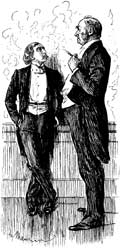Lit Crit insight…
In her lecture, “On not winning the Nobel Prize,” Doris Lessing conspicuously references Tolstoy. Tolstoy of course never won the prize. In a 1950 Atlantic Monthly piece titled “Winning the Nobel Prize” by Naboth Hedin, the first fifty years of the Prize’s history and the question of why Tolstoy was passed over are discussed:
The Permanent Secretary of the Committee, Carl David af Wirsén, bitterly opposed Tolstoy because of his political views. In his report to the Academy as chairman of its Nobel Committee, he said that while he admired “immortal creations” like War and Peace and Anna Karenina, he could not condone Tolstoy’s social and political theories, nor his presumption in rewriting the New Testament “in a half mystical, half rationalistic spirit,” nor, finally, his denial to both nations and individuals of the right of self-defense. “Confronted by such hostility to all forms of civilization,” he wrote, “one feels dubious.” Through his personal pressure, he succeeded in keeping the Prize from the great Russian both then and in the years to come. Wirsén was also successful in opposing an award to Ibsen and to Strindberg, and he almost kept it from going to Selma Lagerlöf.
In her address, Lessing is telling a story…
Now she hands over to him a plastic water container, which he fills. The young woman and the children, watch him closely so that he doesn’t spill any.
She is bending again over the book. She reads slowly but the paragraph fascinates her and she reads it again.
“Varenka, with her white kerchief over her black hair, surrounded by the children and gaily and good-humouredly busy with them, and at the same visibly excited at the possibility of an offer of marriage from a man she cared for, looked very attractive. Koznyshev walked by her side and kept casting admiring glances at her. Looking at her, he recalled all the delightful things he had heard from her lips, all the good he knew about her, and became more and more conscious that the feeling he had for her was something rare, something he had felt but once before, long, long ago, in his early youth. The joy of being near her increased step by step, and at last reached such a point that, as he put a huge birch mushroom with a slender stalk and up-curling top into her basket, he looked into her eyes and, noting the flush of glad and frightened agitation that suffused her face, he was confused himself, and in silence gave her a smile that said too much.”
This lump of print is lying on the counter, together with some old copies of magazines, some pages of newspapers, girls in bikinis.
Art always seems to trump politics, and while I’m sure Lessing is pleased to have won the prize, I’m equally sure it will be seen to have been strictly an honorific and to have had no influence on her work. Rather, it reflects well on the committee to have finally honored her, and the prize has added luster because she won it. Toward the end of her address she says,
You may ask how that piece of the Russian novel ever ended up on that counter in the Indian store?
It would make a pretty story. Perhaps someone will tell it.
…
The storyteller is deep inside everyone of us. The story-maker is always with us. Let us suppose our world is attacked by war, by the horrors that we all of us easily imagine. Let us suppose floods wash through our cities, the seas rise … but the storyteller will be there, for it is our imaginations which shape us, keep us, create us – for good and for ill. It is our stories, the storyteller, that will recreate us, when we are torn, hurt, even destroyed. It is the storyteller, the dream-maker, the myth-maker, that is our phoenix, what we are at our best, when we are our most creative.That poor girl trudging through the dust, dreaming of an education for her children, do we think that we are better than she is – we, stuffed full of food, our cupboards full of clothes, stifling in our superfluities?
I think it is that girl and the women who were talking about books and an education when they had not eaten for three days, that may yet define us.
posted in Creative Arts, Politics, Writing | 0 Comments


